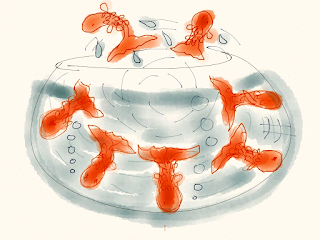* Jeremy Dyer is an acclaimed Cape Town artist.The rivers run, the leaves do fall
Red Sky at Night II by Kimberly Conrad
The earth still turns its trick
The oceans and the prairies roar
But we are very sick.
Blasted earth, the toxins run
The blood is poisoned well
We cannot survive the fun
Of our consumer hell.
Garbage, plastic, rusted bike
It all runs to the sea
Killing man and beast alike
That poison's killing me.
When will we wake, alas too late
It's past the point of fixing
There is a destined, horror date
That no-one will be missing.
I have the hope that birds will sing
Kind winds will blow again
Stopping our destructioning
Healing up our pain.
But will we wake and heal the earth
Get rid of all the 'leaders'?
Reduce the greed, respect the hearth
Deal with all the breeders?
The earth will die, I think it's done
We're in the final hour
What's over when the song is sung
Is the funeral bower.
The rivers run, black as hell
They're dying as we speak
The urgent answers that we seek
Won't be on tv this week.
Showing posts with label pessimism. Show all posts
Showing posts with label pessimism. Show all posts
Monday, 20 August 2018
Our Destined Date
Sunday, 17 January 2016
If Aristotle Visited Us Today
The term 'metaphysics' was born with Aristotle. He was the first who aspired to gathering together all previous philosophical knowledge, and integrating it in a single great work.Perhaps he felt hopeful – as one might feel on a fresh morning in the woods, with the first rays of the sun filtering through the trees. Although he was teased by a few outstanding questions, perhaps Aristotle felt that the end was truly in sight.
Yet if Aristotle visited us today, he might conclude that philosophy is in major crisis. For we have been asking the same fundamental questions – the same perennial questions – for two and a half millennia. And because of that, he might note, we are in a less enviable position than he was. For accumulated knowledge without obvious fruit affects one’s sense of self-confidence. It also undermines hope: the more knowledge, the less hope.
It is natural for the teenager – by way of analogy – to be hopeful about the future, to think that by the age of forty she will certainly know how to live a life, as opposed to her parents who, for some reasons, still do not. But when the age comes, and the former teenager asks the same question and still finds no answer, and suspects something even worse—that at the age of fifty and sixty and seventy she may still have no answer—a sense of unease dawns on her. This is what they call midlife crisis.
One wonders whether Aristotle might see, in the philosophic state of humankind today, the same sort of midlife crisis. He himself had a limited literature or recorded history to look back upon – but we, he might observe, have 2 500 years. This long view of the well-recorded past might give him – as it gives us – a deep sense of unease.
On the one hand, seeing so much treasure accumulated in literature, poetry, drama, philosophy, one can reasonably say, 'Look at the baggage of fine thought we are bringing along. Does this not give hope that its accumulation in the future may be even greater, and that, just as we have seen in technology, there may soon come a qualitative breakthrough? Isn’t this the evidence that we may be onto something? Just one more step, just one more realisation, and we may understand what the good life is?'
On the other hand, this very outlook on the past shows that our thinking, in the most fundamental ways, does not improve with time. Like the bird which greets each morning with the same old song, we fail to recognise that there is nothing new, that our questions are not different from the questions already asked by Aristotle long ago, or better than the answers he already gave.
Our baggage today, Aristotle might observe, is dubious and heavy, for the very ability to know the past and to observe the distance one has travelled without much philosophic growth may make one lose heart. Our human thinking, he might conclude, is somewhat defective, somewhat limited by nature. It could be that, by nature, our mind is incapable of going beyond the Biblical God, Plato’s One, or Aristotle’s Primary Cause. Or it could be that, by nature, our mind does better when dealing with things measurable, yet not so well with things abstract.
Perhaps, then, there is no exiting from the loop, no jumping out of the rut. On the most fundamental issues we will still think in inescapable circles, resembling the fish in the bowl, who thinks it is moving forward while sliding along the concave glass.
Subscribe to:
Posts (Atom)

